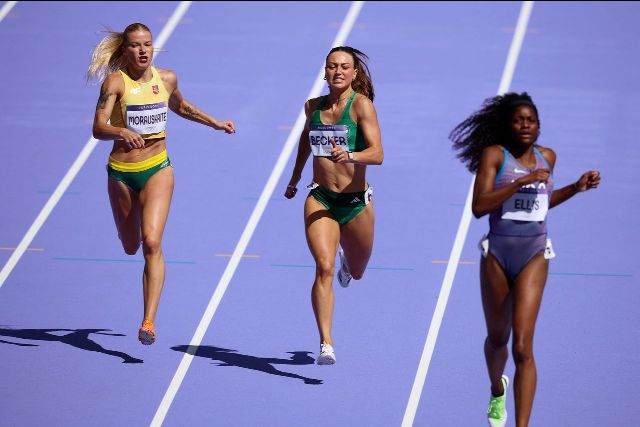Faster, higher, stronger

I haven’t been able to watch a lot of the Olympic Games being held in Paris at the moment. But I’ve seen a few excerpts of incredible athletes all trying to do their utmost to be faster, higher, stronger, or one of the other adjectives describing the qualities needed for their particular sport.
The apostle Paul was clearly familiar with the games, in a number of his letters he refers to running the race. Seeking to inspire others in following Jesus.
Let us run with perseverance the race that is set before us, looking to Jesus the pioneer and perfecter of our faith, (Hebrews 12:1)
Do you not know that in a race the runners all compete, but only one receives the prize? Run in such a way that you may win it. Athletes exercise self-control in all things; they do it to receive a perishable garland, but we an imperishable one. So I do not run aimlessly, nor do I box as though beating the air; but I punish my body and enslave it, so that after proclaiming to others I myself should not be disqualified. (1 Corinthians 9.24-27)
I have fought the good fight, I have finished the race, I have kept the faith. (2 Timothy 4:7)
Of all the races, he saw, I wonder if Paul was referring to finishing the marathon, which is seen by many as the greatest test of endurance and perseverance. It was in the 1984 Los Angeles Olympics that female athletes were first allowed to compete in a marathon. Joan Benoit won that first Olympic Marathon Gold Medal, running into the stadium with seemingly boundless energy. In 37th place it was a different story Gabriela Andersen-Schiess, a Swiss athlete ran out of steam and took 5 agonizing minutes to finish the last lap in the stadium, staying on her feet by will power alone. Watch them both here.
https://www.youtube.com/watch?v=HWtY7Maqwts
In a Japanese Ekiden race relay race, 21 Oct 2018 Rei Iida was near the end of her 3.5km stretch of the Iwatani Sangyo relay marathon in Fukuoka Prefecture when she fell, and couldn’t walk but refused to retire from the race. The 19-year-old university student finished her race on her hands and knees, bloodied from the rough pavement, and handed over the tasuki, (sash) to the next runner. It turned out she had fractured her tibia.
https://www.youtube.com/watch?v=-QxNz5kOzAc&t=4s
Sometimes runners just need an extra push, or encouragement to get over the line: Like Kenyan runner Abel Mutai who was just a few feet from the finish line, but became confused with the signage and stopped, thinking he had completed the race. A Spanish runner, Ivan Fernandez, was right behind him and, realizing what was happening, started shouting at the Kenyan to continue running Mutai didn’t know Spanish and didn’t understand. Realizing what was taking place, Fernandez pushed Mutai to victory. A journalist asked Ivan, “Why did you do that?” Ivan replied, “My dream is that someday we can have a kind of community life where we push and help each other to win.” The journalist insisted “But why did you let the Kenyan win?” Ivan replied, “I didn’t let him win, he was going to win. The race was his.” The journalist insisted, and again asked, “But you could have won!” Ivan looked at him and replied, “But what would be the merit of my victory? What would be the honour in that medal? What would my Mother think of that?”
https://www.youtube.com/watch?v=M41WPkEAeM8
Sometimes runners have done their best but just fall short and need help to finish their race, like Boston College runner Madeline Adams who was helped across the finish line at the ACC Cross Country Championships by Clemson’s Evie Tate and Louisville’s Rachel Pease. Watch the amazing show of sportsmanship here in this ACC Must See Moment! (29 Oct 2016)
https://www.youtube.com/watch?v=7PjBS2AjM7o&t=4s
Occasionally even the very best of runners need help because they just can’t see where they are going, often through no fault of their own. This amazing visually impaired runner named Libby Clegg won gold with this performance at the Rio 2016 Paralympics 200 metres, Chris Clarke was her guide runner. Clarke didn’t qualify for England’s national team and couldn’t compete in the 2016 Olympics, but his journey wasn’t over. He and Clegg trained for two months together so the competition would feel as natural as possible—and it paid off! The power of teamwork is unmatched, Libby also won gold in the 100-metre race.
https://www.tiktok.com/@espn/video/7251685727405116715
I’m looking forward to the closing ceremony when I hope the athletes will be able to celebrate each other’s skill and dedication together, most of them will not go home with one of the three medals in their events. But we will have watched them stay focused and calm in the heated moments, handle disappointment, setbacks and losing with grace, champions who withdrew from their event due to mental stress, and others who show great flexibility and adaptability. These are all signs of maturity for athletes who in the past have been raised with the motto that winning is everything.
We too can learn much from the example of these and many, many other athletes. Often, we will need perseverance and endurance in our faith journey, we too, will need that extra little push from time to time, we will need help to get where we want to be, and often a guide when we can’t see where we are going. Maybe in our many battles, like Ivan Fernandez we need to have in mind, “But what would be the merit of my victory? What would be the honour in that victory? What would God think of that?”
(with thanks to Rev Dr Peter Mallen for inspiration from an article he wrote for Croydon UC in July 2021.)
David Higham
Presbytery Chairperson

